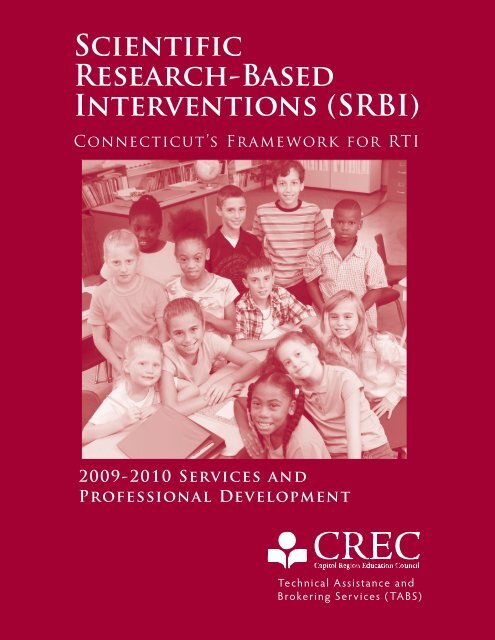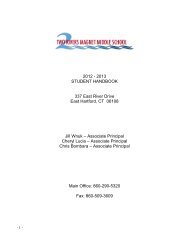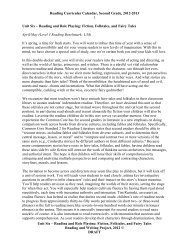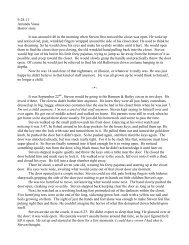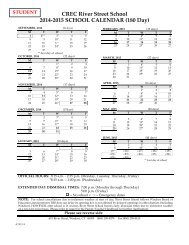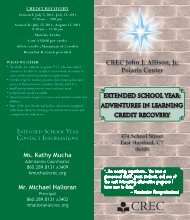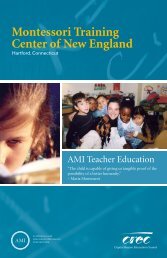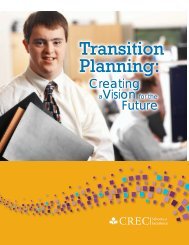Scientific Research-Based Interventions (SRBI)
Scientific Research-Based Interventions (SRBI)
Scientific Research-Based Interventions (SRBI)
Create successful ePaper yourself
Turn your PDF publications into a flip-book with our unique Google optimized e-Paper software.
<strong>Scientific</strong><br />
<strong>Research</strong>-<strong>Based</strong><br />
<strong>Interventions</strong> (<strong>SRBI</strong>)<br />
Connecticut’s Framework for RTI<br />
2009-2010 Services and<br />
Professional Development<br />
Technical Assistance and<br />
Brokering Services (TABS)
<strong>Scientific</strong> <strong>Research</strong>-<strong>Based</strong> Intervention Services<br />
CREC is uniquely poised to provide training, professional development, and technical assistance for districts and<br />
schools in the implementation of a <strong>SRBI</strong> framework. CREC’s Two Rivers Magnet Middle School, in its fifth year of<br />
implementation, is an <strong>SRBI</strong> model school site. Our educational specialists can work with your district or school, to<br />
provide the following <strong>SRBI</strong> support:<br />
• <strong>SRBI</strong> Readiness Assessment for Schools and Districts<br />
• Introduction to <strong>SRBI</strong> – The Academic and Behavioral Domains<br />
• <strong>SRBI</strong> Action Planning and Roll Out – District-wide and School-Specific Components<br />
• <strong>SRBI</strong> Support to School and District Leaders<br />
• <strong>SRBI</strong> Methods and Structures for Primary, Elementary, Middle and High School Levels<br />
• Strengthening Tier 1 – Best Practices in Curriculum, Instruction, Assessment, and Data Driven<br />
Decision Making<br />
• Best Practices in Universal Screening and Progress Monitoring<br />
• Building Intervention Systems in Grades Pre K-12<br />
• Effective Reading and Math Intervention Strategies for all Tiers<br />
• Special Education Staff – Complimentary Roles in <strong>SRBI</strong> and Special Education<br />
• Building a Positive School Climate Using the RTI Model<br />
• Effective Behavior <strong>Interventions</strong> for Small Student Groups and Individuals at all Tiers<br />
• Early Childhood Recognition Response<br />
We offer dynamic professional development designed to provide a blueprint for implementing RTI. Participants<br />
may take one or all of the modules. We can customize training and technical assistance and deliver it in your<br />
district to meet local needs.<br />
CREC Publication – Response to Intervention: A Planning and<br />
Implementation Guide for School Practitioners<br />
Copies of this CREC publication are available for $27 per copy or $24 per copy for<br />
ten or more copies. To order, please e-mail: jszewczak@crec.org<br />
For information on <strong>SRBI</strong> services and products, contact Margaret (Peg) MacDonald<br />
at 860-524-4037 or mmacdonald@crec.org or Ellen Cohn at elcohn@crec.org.<br />
For detailed information on workshops and to register please visit our web<br />
site: www.crec.org/TABS and click on EVENTS or contact Jeanne Szewczak at<br />
860-524-4022 or jszewczak@crec.org.<br />
RTI is the practice of providing scientific, research-based instruction and intervention matched to students’<br />
needs, with important educational decision based on students’ levels of performance and learning rates over time<br />
(NASDSE,2005). The basic principles underlying RTI have been endorsed by the Connecticut State Department of<br />
Education (CSDE). An internal state-level leadership team charged with operationalizing these principles decided<br />
to refer to this process in Connecticut as <strong>SRBI</strong> (scientific research-based interventions) because the language<br />
is contained in both NCLB (Section9101(37) of ESEA) and IDEA Regulations (Section 300.307 (a)(2)). This<br />
publication refers to RTI and <strong>SRBI</strong> interchangeably with both terms placing emphasis on the centrality of general<br />
education and the importance of using interventions that are scientific and research-based.<br />
CREC <strong>Scientific</strong> <strong>Research</strong>-<strong>Based</strong> <strong>Interventions</strong> (<strong>SRBI</strong>) 1
<strong>Scientific</strong> <strong>Research</strong>-<strong>Based</strong> Intervention: The Basics<br />
<strong>SRBI</strong> Framework – Model Site Observation And Training<br />
September 29, 2009, 9 a.m. - 3 p.m., Presenter: Ellen Cohn<br />
This overview of the <strong>SRBI</strong> framework will teach participants about the theoretical and practical aspects of<br />
implementing <strong>SRBI</strong>. It includes tours of Tier 1, 2, and 3 classrooms where participants will experience <strong>SRBI</strong><br />
in practice.<br />
<strong>SRBI</strong> Basic Training—CALI<br />
To register, click here<br />
October 20 and 21, 2009, 9 a.m. - 3 p.m., Presenters: Ellen Cohn, Lisa Fiano, Sonya Kunkel, and Peg MacDonald<br />
Participants will examine current practices to determine which <strong>SRBI</strong> components are currently being implemented<br />
in their school and/or district and which need to be improved or developed. They will be introduced to the<br />
components and key elements of the <strong>SRBI</strong> framework, examine current beliefs that foster student learning, and<br />
establish priorities and goals for the implementation of <strong>SRBI</strong>.<br />
A Leadership Model for School Change in Response to <strong>SRBI</strong><br />
Date and time TBD, Presenter: Michael Regan<br />
Administrators play a key role in creating opportunities for change at both the district and school level. This<br />
training will examine the leadership required for successful implementation of the <strong>SRBI</strong> framework and provide<br />
a forum to address barriers to implementation. Specific topic areas include leadership attitudes that are congruent<br />
with <strong>SRBI</strong>, key leverage points that make Tier 1 the primary prevention it should be, clarity in intervention goals<br />
and programming, scheduling and finding time for collaboration to support <strong>SRBI</strong>, and harnessing the creative<br />
problem solving of a committed school staff.<br />
The Changing Role of the Student Support Services<br />
Professionals in a Successful <strong>SRBI</strong> Framework<br />
Date and time TBD, Presenter: Michael Regan<br />
This training will focus on the changing role of the school psychologist, social worker, speech pathologist, and<br />
occupational therapist within the <strong>SRBI</strong> framework. Emphasis will be given to the application of consultation skills<br />
within the group process and assisting teams in analyzing data for educational decision making.<br />
Tier 1 Primary Prevention of Learning Problems<br />
Tier 1 – The Foundation of Your School<br />
October 14, 2009, 9 a.m. - 3 p.m., Presenter: Ellen Cohn<br />
This module explores the critical components to Tier 1 such as a strong core curriculum, research-based effective<br />
teaching strategies, a comprehensive common assessment plan, the importance of becoming a data-andinformation-rich<br />
school, and data-driven decision making.<br />
Common Summative and Formative Assessment<br />
for Rapid Gains in Student Performance<br />
October 26, 2009, 9 a.m. - Noon, Presenter: Ellen Cohn<br />
To register, click here<br />
To register, click here<br />
To register, click here<br />
This module focuses on the single greatest leverage point to improving the strength of Tier 1, the power of common<br />
summative and formative assessment to drive continuous improvement of curriculum, instruction, and ultimately<br />
student performance. Participants will learn how to work together to analyze data and assessment results, and<br />
develop a collaborative culture of data-driven decision making and continuous improvement.<br />
2 CREC <strong>Scientific</strong> <strong>Research</strong>-<strong>Based</strong> <strong>Interventions</strong> (<strong>SRBI</strong>)
Tier 1 Primary Prevention of Learning Problems<br />
What Every School Leader Needs to Know About<br />
Good Literacy Teaching and Effective Literacy Coaching<br />
September 29 and 30, October 1, December 1 and 2, 2009, 8:30 a.m. - 3:30 p.m., Presenter: Irene Fountas<br />
This dynamic professional development seminar is designed for leaders who are interested in examining the roles<br />
of effective teaching, student assessment, coaching, and supervision in improving student achievement in reading<br />
and writing. Participants will use observational tools to examine the classroom environment and best teaching<br />
practices, including developing a sound foundation of literacy theory, assessment, and best practices such as<br />
guided reading, interactive writing, genre study, and word study.<br />
Progress Monitoring and Implementation Fidelity<br />
<strong>Research</strong>-<strong>Based</strong> Universal Screening and Progress Monitoring<br />
November 2, 2009, 9 a.m. - 3 p.m., Presenters: Ellen Cohn and Sonya Kunkel<br />
This training helps participants understand and develop a system of universal screening and progress monitoring<br />
that effectively identifies struggling students and monitors their learning during intervention. Participants will<br />
learn about the administration, scoring, graphing and interpretation of curriculum based measures for reading and<br />
math. They will be able to evaluate district or grade level assessments as potential screening and monitoring tools.<br />
Using Technology to Assist in Data Management and Decision Making<br />
Date and time TBD, Presenter: Michael Regan<br />
Participants will learn how to use technology at the school or district level to assist in analyzing and managing<br />
data within an <strong>SRBI</strong> framework. Topics include: electronic databases, teacher-made reporting programs, data<br />
warehousing and management, and analysis of data trends for decision making.<br />
Using <strong>SRBI</strong> Framework for Determination of Student Progress<br />
and Special Education Eligibility<br />
Date and time TBD, Presenter: Michael Regan<br />
School-based teams will gain a better understanding of the use of progress monitoring to improve student<br />
learning outcomes. School teams are asked to bring several examples of student work from their district for<br />
analysis and sharing.<br />
Early Childhood<br />
The Recognition and Response Model in Early Childhood<br />
Date and time TBD, Presenter: Lisa Wheeler<br />
This workshop provides practical application strategies for recognition and<br />
response implementation utilizing a collaborative problem-solving team<br />
approach.<br />
Recognition and response requires programs to adopt high-quality<br />
curriculum that is aligned with the preschool curriculum and assessment<br />
framework. Teachers track the amount and rate of growth for each student<br />
and, as with <strong>SRBI</strong>, use a hierarchy of increasingly intense interventions. It is<br />
designed to address all aspects of early learning and development in young<br />
children.<br />
If you are interested in learning more about this model and/ or bringing this<br />
training into your organization, please contact Lisa Wheeler at 860-524-4059<br />
or lwheeler@crec.org<br />
To register, click here<br />
To register, click here<br />
CREC <strong>Scientific</strong> <strong>Research</strong>-<strong>Based</strong> <strong>Interventions</strong> (<strong>SRBI</strong>) 3
Common Assessment Consortium<br />
The CREC Common Assessment Consortium was established to help our school districts come together to<br />
develop and use common formative assessment tools to measure students’ progress. We offer multiple levels<br />
of support, all of which include access to CREC math, reading and science assessments and item banks,<br />
grades 3-8.<br />
An analysis of the CREC assessments and CMT results have concluded that CREC’s common benchmark<br />
assessments serve as valuable tools in helping predict how students are likely to perform on state<br />
assessments. For more information, please visit: www.crec.org/tls/services/consortium or contact<br />
Dina Crowl, Division Director for Teaching and Learning at 860-509-3603 or Jessica Martin at 860-524-4076.<br />
Literacy Intervention Program Design and Strategy Selection<br />
Building Dynamic Standard Treatment Protocols<br />
for Reading Intervention at the Elementary Level<br />
November 12, 2009, 9 a.m. - Noon, Presenter: Ellen Cohn<br />
This module will help participants develop a systems approach to reading intervention in all three tiers by taking<br />
the best of existing reading intervention programs and aligning the components with <strong>SRBI</strong> principles. It is designed<br />
for district or elementary staff members who design, build, or deliver reading intervention services.<br />
Building Dynamic Standard Treatment Protocols<br />
for Reading Intervention at the Secondary Level<br />
November 17, 2009, 9 a.m. – Noon, (snow date December 4, 2009), Presenter: Ellen Cohn<br />
This module will help participants develop a systems approach to reading intervention in all three tiers, focusing<br />
on the reading comprehension, fluency, and decoding needs of their secondary level students. It is designed for<br />
district, middle or high school staff members who design, build, or deliver reading intervention services.<br />
What Every School Leader Needs to Know<br />
About Good Literacy Teaching and Effective Literacy Coaching<br />
September 29 and 30, October 1, December 1 and 2, 2009, 8:30 a.m. - 3:30 p.m., Presenter: Irene Fountas<br />
See seminar description on page 3.<br />
University of Kansas, Strategic Instruction Model-Reading<br />
Comprehension and Study Strategies – Paraphrasing Strategy<br />
October 19, 2009, 8:30 - 11:30 a.m., Presenter: Sonya Kunkel<br />
To register, click here<br />
To register, click here<br />
The paraphrasing strategy is designed to help students focus on the most important information in a passage.<br />
The scientifically-based research indicates that students who are taught this strategy through all eight strategic<br />
instruction stages can independently improve reading comprehension during and after reading by 36 percent on<br />
grade level materials. The strategic instruction is designed for short term small group intervention.<br />
University of Kansas, Strategic Instruction Model-Reading<br />
Comprehension and Study Strategies – Self-Questioning Strategy<br />
November 9, 2009, 8:30 - 11:30 a.m., Presenter: Sonya Kunkel<br />
To register, click here<br />
To register, click here<br />
To register, click here<br />
The self-questioning strategy helps students create their own motivation for reading before and during reading<br />
activities. <strong>Scientific</strong>ally-based research results have shown average gains of 40 percentage points in reading<br />
comprehension on grade-level materials after students have learned this strategy. This strategy uses the same eight<br />
stage strategic instruction process as used in the paraphrasing strategy.<br />
4 CREC <strong>Scientific</strong> <strong>Research</strong>-<strong>Based</strong> <strong>Interventions</strong> (<strong>SRBI</strong>)
Literacy Intervention Program Design and Strategy Selection<br />
Multi-Sensory Language (MSL) Instruction<br />
That Works for Adolescent Learners<br />
November 6, 2009, 8:30 a.m. - 3:30 p.m., Presenter: Lisa Fiano<br />
This module provides multi-sensory language techniques and a lesson format for instruction that is explicit,<br />
systematic and cumulative, and that can be applied to MSL programs commonly found in schools. Instructional<br />
routines for reading, spelling and writing using multi-sensory structured language strategies and assistive<br />
technologies that support adolescent learners to be successful in the classroom will be learned in this module.<br />
Supporting Literacy Instruction in Grades 5-12:<br />
Low-and High-Tech Assistive Technologies<br />
December 1, 2009, 8:30 a.m. - 3:30 p.m. (snow date December 9, 2009), Presenter: Nicole Natale<br />
Teachers and instructional support staff will learn the use of both high-and low-tech assistive technologies (AT)<br />
that support literacy instruction. Various AT supports for literacy will be provided, along with a framework for<br />
AT assessment in literacy. Participants will create intervention plans that include AT strategies and supports for<br />
students within the general education curriculum.<br />
Numeracy Intervention Program Design and Strategy Selection<br />
Building Dynamic Standard Treatment Protocols<br />
for Math Intervention at the Elementary Level<br />
December 8, 2009, 9 a.m. - Noon, (snow date January 13, 2010), Presenter: Ellen Cohn<br />
This module will help participants develop a systems approach to math intervention in all three tiers by taking<br />
the best of existing math intervention programs and aligning the components with <strong>SRBI</strong> principles. The module is<br />
designed for district or elementary staff members who design, build, or deliver math intervention services.<br />
Building Dynamic Standard Treatment Protocols<br />
for Math Intervention at the Secondary Level<br />
To register, click here<br />
To register, click here<br />
To register, click here<br />
To register, click here<br />
December 14, 2009, 9 a.m. - Noon, (snow date January 20, 2010), Presenter: Ellen Cohn<br />
This module will help participants develop a systems approach to math intervention in all three tiers. The module<br />
is designed for middle and high school staff who design, build or deliver math intervention services.<br />
CREC <strong>Scientific</strong> <strong>Research</strong>-<strong>Based</strong> <strong>Interventions</strong> (<strong>SRBI</strong>) 5
Positive School Climate and Student Behavior<br />
Improving Student Behavior - Tier 1 Practices<br />
September 30, 2009, 9 a.m. - 3 p.m., Presenters: Ellen Cohn, Donna Morelli, and Cynthia Zingler<br />
Tier 1 focuses on improving student behavior across school settings by implementing a school wide system that<br />
engages students, maintains high standards, and gives students recognition for positive choices, growth, and<br />
improved decision making.<br />
Group Behavioral Instruction and Intervention<br />
October 29, 2009, 8:30 - 11:30 a.m., Presenters: Donna Morelli and Cynthia Zingler<br />
Tier 2 provides supplemental small group behavioral instruction and intervention for students who are not meeting<br />
with success within Tier 1. (Tier 2 meets the needs of approximately 10-15 percent of students not meeting success<br />
in Tier 1).<br />
Individual Student Behavioral Instruction and Intervention<br />
November 10, 2009, 8:30 - 11:30 a.m., Presenters: Donna Morelli,<br />
and Cynthia Zingler<br />
Tier 3 provides intensive small group or individual intervention for students who have not responded to<br />
interventions within Tiers 1 and 2 and generally helps the remaining 5 percent of students find success.<br />
Improving School Climate to Support Student<br />
Achievement Basic Training—CALI<br />
To register, click here<br />
To register, click here<br />
To register, click here<br />
To register, click here<br />
October 8 and 15, 2009, 9 a.m. - 3 p.m., Presenters: Donna Morelli, Peg MacDonald, and Cynthia Zingler<br />
In this basic CALI training module participants will learn that the quality of school climate is all about relationships<br />
which are determined by how well the people within the school treat each other physically, emotionally, and<br />
intellectually. This module offers practical strategies including data gathering on how to improve school climate to<br />
support student achievement.<br />
6 CREC <strong>Scientific</strong> <strong>Research</strong>-<strong>Based</strong> <strong>Interventions</strong> (<strong>SRBI</strong>)


